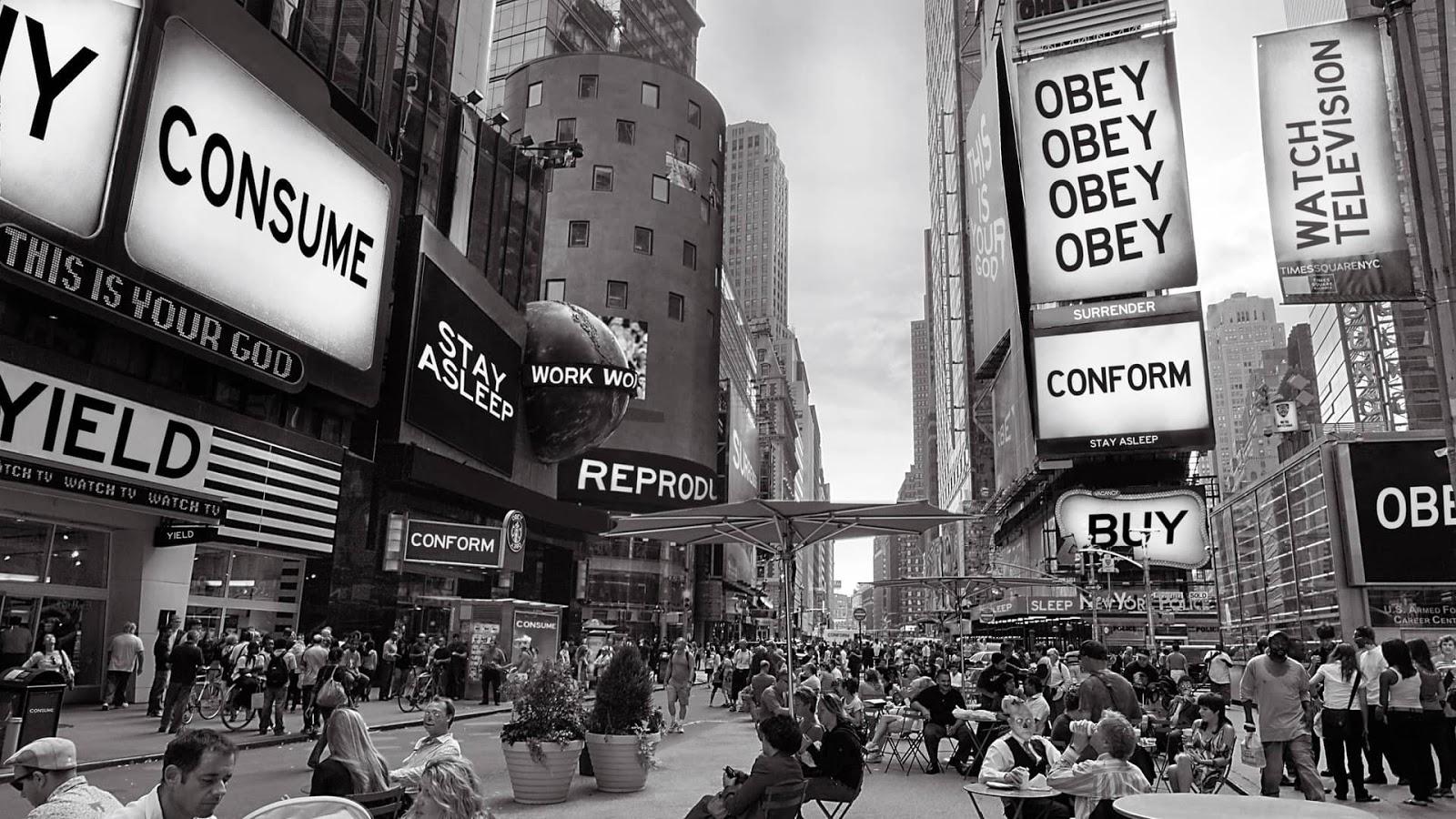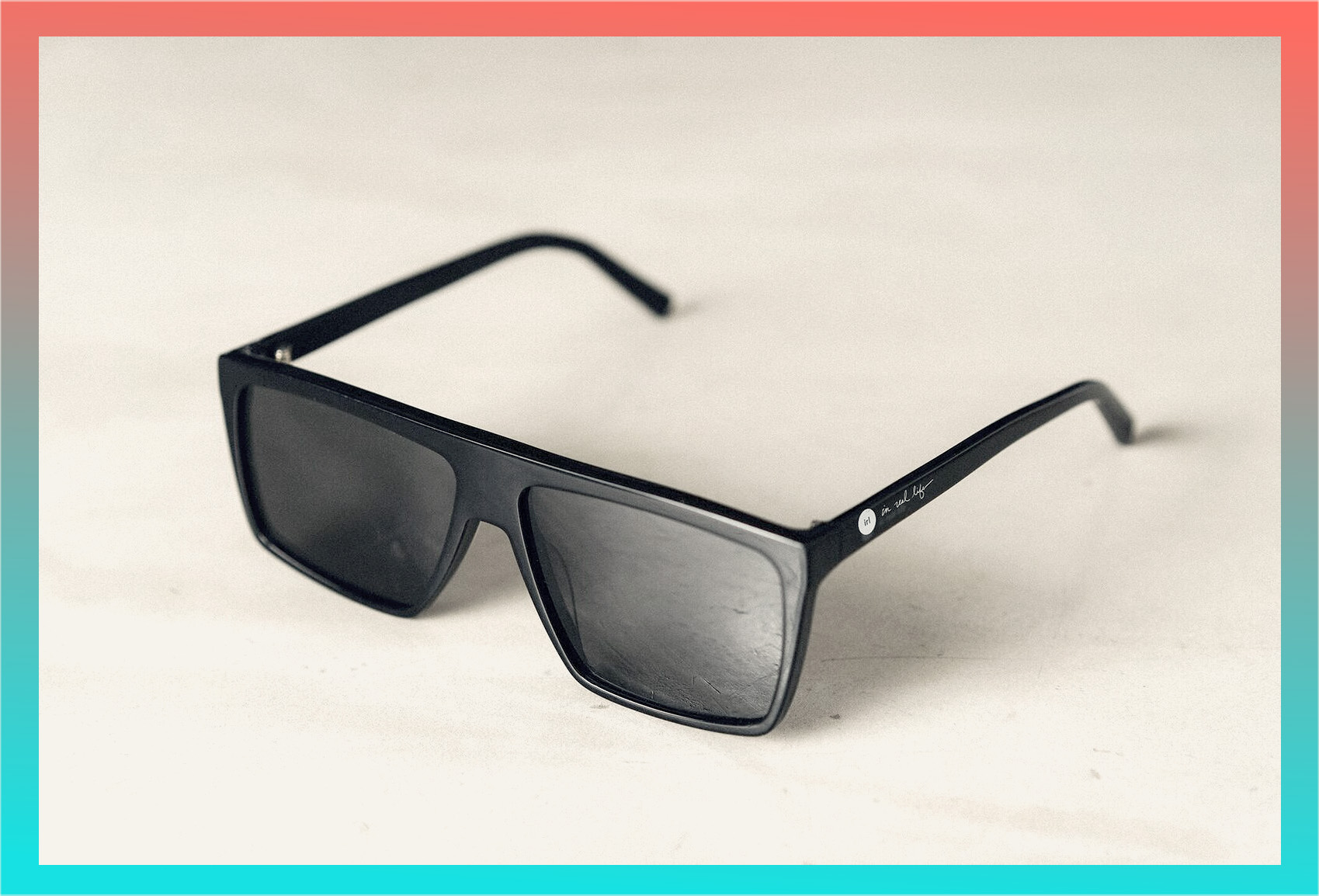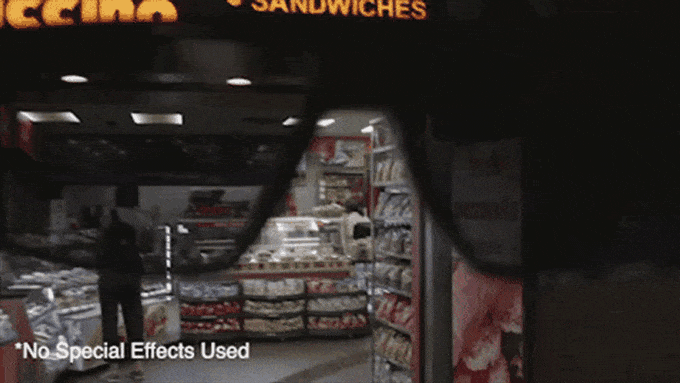IRL Glasses Block Screens & Bring You Back to Pre-Tech World
In John Carpenter’s 1988 cult classic film They Live, a flannel-swaddled drifter finds a magical pair of sunglasses. When he puts them on, he’s blown away to discover they expose coded subliminal messages hidden in everyday life, and perhaps more importantly—aliens. The bad kind.

The world of They Live is a lot like the one we live in today. Except for those aliens, who were sadly just some kind of metaphor.
Screens are everywhere, beaming information into our eyes, ears, and brains faster than we can consciously process it. If the technology and mass media of 1988 seemed intrusive, the techified world of 2018 is absolutely off the rails.
To help deal with this madness, Scott Blew and Ivan Cash created IRL Sunglasses. They’re inspired by They Live, and called IRL because they encourage existing in real life. When you wear them, screens appear blank.
Now you can see the world the way it really is. The way it used to be.
The people behind IRL Glasses think we need more time IRL

Their Kickstarter campaign was launched the week of October 7th, and they’ve already (as of writing) collected upwards of $132,150 USD in funding (Editors note: as of November 2018, the IRL Glasses project raised a total of $140,920 USD). That’s well above their $25,000 goal. The people have spoken, and they want some new glasses.
Americans spend 11 hours a day looking at screens (NY Times 2018), and for some of us, the figure is surely more. We’re entranced by the dopamine-kick of our devices, drawn to their comforting glow and promise of endless information and entertainment.
A recent study has found that we spend more than 50 hours a week with our personal devices. Meanwhile, television consumption for the average North American is dropping, but it still averages out at a whopping 292.6 minutes a day. When you consider most of us work 35-40 hours a week, sleep around 49 hours a week, and have to deal with personal hygiene, care, relationships, the groceries, etc.—that’s really an incredible amount of time to stare at glowing stuff.
Ronald Reagan may no longer be president, but the anti-TV, anti-mass media agitation built into They Live is still totally relevant. Except now instead of leaving basic cable on all evening and being advertised to 30% of the time, we’re steady-stream binge-watching on Hulu or Netflix, wheeling through our social media feeds, and Like-ing what we like.
Trying to think of a way to get around this hegemonic screen-feed, Los Angeles based founder Scott Blew hit on the idea of IRL Glasses at the beginning of 2017. He then brought the prototype of the sunglasses to his friend Ivan Cash, who agreed the concept of a device that blocks ads (and more) was extremely timely.
Cash’s background is primarily as an artist with a strong anti-tech streak. He seems to have a knack for coming up with concepts that strike a nerve.
Case in point, his ‘No-Tech Zone’ guerilla sign-installation spree in San Francisco. Cash installed a series of very official-looking signs stating ‘No cell phones, tablets, laptops, or smart devices permitted—violators subject to $300 fine.’ The signs went viral, landing him press from The Guardian, CBS, NBC, and Mashable. He also appeared on TV on Fox-owned Bay Area channel KTVU.
But for all his public agitation, Cash confesses he’s is a bit weak personally when it comes to the shiny screen, stating: “we’re all trying to develop more balance in our lives.”
Indeed, 11 years after the smartphone made its debut, a lot of people are starting to wonder how they can save their eyes while remaining a part of society. If we have indeed reached peak screen, it might just be the perfect time to break out an anti-screen, anti-tech product.
The IRL Glasses sales pitch, according to Cash, boils down to this: “we need and deserve a product like this, one that puts us all in the driver’s seat to control technology and not the other way around.”
Coming to terms with screen time’s negative effects IRL
Yes, sir, it’s time to do something about screen time. And it turns out some people are already taking pretty serious action against too-much-screen, as well as tech invasiveness writ large. But they might not be the people you think.
In actuality, right now some of the most prominent advocates for anti-tech are—in some twisted, ironic way—the Silicon Valley tech leaders themselves. Folks working at some of the world’s most successful tech firms are overwhelmingly opting to send their kids to low-tech schools. Yes, literally the same people who are behind social media, smart devices, software et al. are actively limiting or banning the use of that same technology when it comes to their families.
Some of the major names on this list include Bill Gates and Steve Jobs. Gates didn’t let his kids have cell phones until age 14. Jobs, somewhat infamously, didn’t let his kids use the iPad when it came out in 2011.
There’s an increasing divide appearing in attitudes: as tech-moguls, elites, and well-off people stick their kids in anti-technology schools and home regimes, while public schools embrace the tech revolution in learning.
It’s a bit like hearing your favorite whiskey distiller is run by secret teetotalers, or finding out that non-smokers are the ones marketing and selling the cigarettes you puff (socially only, of course). The informed creators of this technology are working to mitigate its negative effects for the people close and important to them, while the masses are targeted, kept in the dark about the unseemly realities of their favorite Web 2.0 products, and invited to use, use, use.
What exactly are we to make of this disconnect between product makers and product users? It certainly looks like a lot of tech is being implemented to coerce and control from above, and to manipulate people unawares into complacency and distraction. In other words, it looks a lot like the John Carpenter movie.
While the convenience and access of the ‘screen era’ may once have seemed liberating, we’re now coming round to seeing its potential for very negative social and mental health repercussions.
According to an ever-growing body of research, social media and modern tech, more broadly, have demonstratively negative effects on the social aptitude and psychological development of children. Too much tech corresponds with lesser aptitude in nonverbal communication and lower empathy. For adults, excessive tech-time can contribute to self-concealment (aka. hiding in your lair), sleep disorders, depression, warped self-perception and self-esteem problems, and so on and so forth.
The emphasis on producing products with addictive characteristics, which is of course all about the bottom line, has created social problems we have only started to deal with.
Do you remember that time, not so long ago, when you’d go on public transit and people would be reading, talking to one another, or just looking out the window at passing scenery? Now messing around with your phone is the baseline normal social behavior, a means of looking busy, killing time, and avoiding looking directly at maniacs.
Surely the old, pre-iPhone world wasn’t idyllic. But it certainly offered more genuine human connection; it was a world that belonged more to humans than screens.
IRL Glasses want us to step back into that world whenever we feel like it. When we’re going a bit loco and eyesore, we can dial back by slapping on some shades.
The IRL Glasses roadmap to all-screen blocking
To achieve erasure of invasive visual technology, IRL Glasses creators’ Blew and Cash did some DIY R&D.
They began by trying Casper Cloaking Technology by Steelcase, a screen-blocking film. Overlaying it on a pair of sunglasses, they marveled at how it made screens go black. Later on, they discovered they could achieve this same effect in a more low-tech way, with polarized lenses flattened and turned 90 degrees.

The resulting pair of glasses blocks LCD and LED screens. That means the v1.0 product pretty much blocks all TVs, as well as some computers. Meanwhile, you’re still going to have to use self-control to deal with your iPhone. As of yet you can’t shut out the light emitted by smartphones or OLED digital billboards, but a product that can block all screens should be available in the future.
A polarized lens also provides UV 400 protection, which means the product totally works as a normal pair of shades too.
In terms of sartorial direction, the glasses are designed to mimic the style of the ones seen in John Carpenter’s flick. They’re big, black acetate, and square-framed with dark grey-tinted lenses. Very retro-chic.
Birthed by a flash of John Carpenter-inspired epiphany, IRL Glasses have been seriously worked into a long-term product project with about a year of R&D before even getting to the fundraising page.
Blew and Cash produced the first working prototype in January 2018, then tweaked it until July, when they finally settled on a final product. For the duration of production, they held focus groups to make sure people would actually buy and use the finished product.
For the boutique, deeper-pocketed crowd, IRL Glasses also teamed with some designers to put out limited edition, one-of-a-kind custom glasses. Their collaborators include Shantell Martin, Mike Perry, Jessica Hische, ZEBU, and Leta Sobierajski.
Each of these collab pieces was available if you pledged a hearty $499 USD or more on Kickstarter. They’re now totally sold out.
These glasses and the normal ones will be shipped out in April 2019 for everyone who’s backed the Kickstarter. For everyone else just waiting for the drop, the retail price for a pair will set you back $79 USD.
Are they worth that much scratch, you might ask?
Well, to qualify that, I would first check out the Kickstarter trailer—it explains the product’s philosophy and utility pretty well. You get why they’d be useful, practical, and a cool design object to boot.
Although to be fair, there’s also a couple pretty guffaw-inducing moments in there. For example, check out the part where a dude is sitting on the sofa with his TV turned on. He puts on the sunglasses to block the image and lets out a sigh of relief. Why not just use the remote and turn off the TV? A fair observation but clearly the guys behind IRL glasses have a sense of humor about their product as well.
So maybe the best place for your IRL sunglasses isn’t in your living room, but they would certainly have a cool effect in urban centers like NYC – Time Square would obviously be on the IRL sunglasses tour guide.
A pair of these bad boys will kill the visual pollution from TVs and some computers. Whether you’re grabbing dumplings at your fave strip mall restaurant or killing time in the airport sports bar, you’ll be able to filter out the TVs blaring FOX News, CNN, or some other variety of high-intensity background-noise.
Part of the deal for v1.0 of the product is that the Kickstarter funding, and the initial ‘beta’ version sales, will all help fund R&D. That means Blew and Cash will be able to produce an all-screen blocking pair of glasses in the future, which truly would be the Holy Grail.
Less screen time, fewer interruptions at work, and a little more peace IRL
We’re having our cognitive faculties hijacked all the time. Things have to change.
We try to get down to work, but then we go on our Facebook news feed and indulge in an endless scroll, just assimilating random information interspersed with sponsored ads. At the office, we glance at TV displays in other rooms and other people’s devices.
You’re about to write an important email, but you see an alert flash on your phone and get sucked down a wormhole instead. 20 minutes pass before you come to and remember what you were supposed to be doing.
We process a bunch of random information, consciously or subconsciously. It tires our eyes and brains out. Against this backdrop of tech fatigue, IRL Sunglasses appear.
1988 called—they want 2018 to have their glasses because they feel sorry for them
One might rightly view this product as part of a new wave of products trying to capitalize on ‘bringing balance’ into our lives. Case in point: meditation and mindfulness apps like Headspace are enjoying a growing audience, as more people search for tools to help us slow down. Or perhaps, IRL glasses make the perfect new ‘best seller’ for the Sharper Image catalog.
Ultimately, the market exists because we all want to find room to think more calmly and clearly.
It’ll be interesting to see if and how the IRL Glasses concept is advanced in the future. It’s great to block LCD and LED, after all, but something needs to be done about those pesky iPhones.
Judging by the insane Kickstarter and media interest the glasses have kicked up in just a few weeks, Blew and Cash are barking up the right tree.
In They Live, the glasses showed the truth. IRL, the glasses are going after a reclamation of the now almost ancient concept of genuine human connection. These glasses propose the crazy idea of getting out of the screen world and back into the land of the living.
According to IRL Glasses Kickstarter page, the first round of glasses will be shipped to backers April 2019. Stay tuned for updates on the IRL 2.0 project, which the team plans to begin R&D on June 2019.




